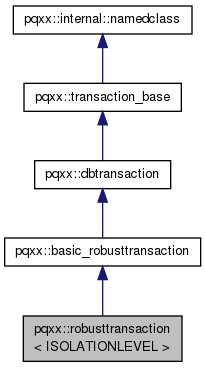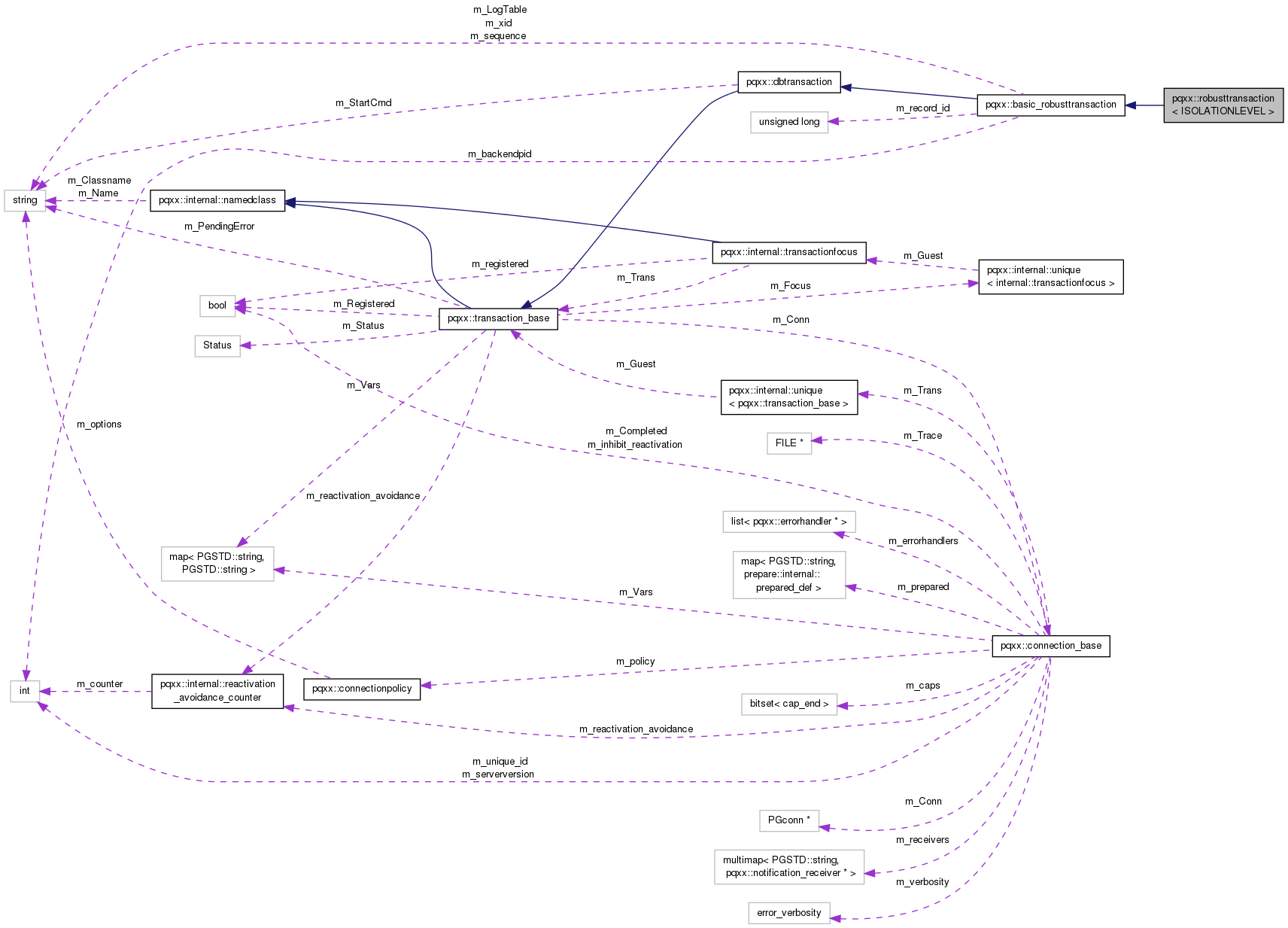|
| | robusttransaction (connection_base &C, const PGSTD::string &Name=PGSTD::string()) |
| | Constructor. More...
|
| |
| virtual | ~robusttransaction () throw () |
| |
| void | abort () |
| | Abort the transaction. More...
|
| |
| const PGSTD::string & | classname () const throw () |
| |
| void | commit () |
| | Commit the transaction. More...
|
| |
| connection_base & | conn () const |
| | Connection this transaction is running in. More...
|
| |
| PGSTD::string | description () const |
| |
| PGSTD::string | esc (const char str[]) const |
| | Escape string for use as SQL string literal in this transaction. More...
|
| |
| PGSTD::string | esc (const char str[], size_t maxlen) const |
| | Escape string for use as SQL string literal in this transaction. More...
|
| |
| PGSTD::string | esc (const PGSTD::string &str) const |
| | Escape string for use as SQL string literal in this transaction. More...
|
| |
| PGSTD::string | esc_raw (const unsigned char str[], size_t len) const |
| | Escape binary data for use as SQL string literal in this transaction. More...
|
| |
| PGSTD::string | esc_raw (const PGSTD::string &) const |
| | Escape binary data for use as SQL string literal in this transaction. More...
|
| |
| result | exec (const PGSTD::string &Query, const PGSTD::string &Desc=PGSTD::string()) |
| | Execute query. More...
|
| |
| result | exec (const PGSTD::stringstream &Query, const PGSTD::string &Desc=PGSTD::string()) |
| |
| PGSTD::string | get_variable (const PGSTD::string &) |
| | Get currently applicable value of variable. More...
|
| |
| const PGSTD::string & | name () const throw () |
| |
| internal::parameterized_invocation | parameterized (const PGSTD::string &query) |
| | Parameterize a statement. More...
|
| |
| template<typename T > |
| PGSTD::string | quote (const T &t) const |
| | Represent object as SQL string, including quoting & escaping. More...
|
| |
| PGSTD::string | quote_name (const PGSTD::string &identifier) const |
| | Escape an SQL identifier for use in a query. More...
|
| |
| PGSTD::string | quote_raw (const unsigned char str[], size_t len) const |
| | Binary-escape and quote a binarystring for use as an SQL constant. More...
|
| |
| PGSTD::string | quote_raw (const PGSTD::string &str) const |
| |
| void | set_variable (const PGSTD::string &Var, const PGSTD::string &Val) |
| | Set session variable in this connection. More...
|
| |
|
| prepare::invocation | prepared (const PGSTD::string &statement=PGSTD::string()) |
| | Execute prepared statement. More...
|
| |
|
| void | process_notice (const char Msg[]) const |
| | Have connection process warning message. More...
|
| |
| void | process_notice (const PGSTD::string &Msg) const |
| | Have connection process warning message. More...
|
| |
template<isolation_level ISOLATIONLEVEL = read_committed>
class pqxx::robusttransaction< ISOLATIONLEVEL >
Slightly slower, better-fortified version of transaction.
robusttransaction is similar to transaction, but spends more effort (and performance!) to deal with the hopefully rare case that the connection to the backend is lost just as the current transaction is being committed. In this case, there is no way to determine whether the backend managed to commit the transaction before noticing the loss of connection.
In such cases, this class tries to reconnect to the database and figure out what happened. It will need to store and manage some information (pretty much a user-level transaction log) in the back-end for each and every transaction just on the off chance that this problem might occur. This service level was made optional since you may not want to pay this overhead where it is not necessary. Certainly the use of this class makes no sense for local connections, or for transactions that read the database but never modify it, or for noncritical database manipulations.
Besides being slower, it's theoretically possible that robusttransaction actually fails more instead of less often than a normal transaction. This is due to the added work and complexity. What robusttransaction tries to achieve is to be more deterministic, not more successful per se.
When a user first uses a robusttransaction in a database, the class will attempt to create a log table there to keep vital transaction-related state information in. This table, located in that same database, will be called pqxxlog_*user*, where user is the PostgreSQL username for that user. If the log table can not be created, the transaction fails immediately.
If the user does not have permission to create the log table, the database administrator may create one for him beforehand, and give ownership (or at least full insert/update rights) to the user. The table must contain two non-unique fields (which will never be null): "name" (of text type, varchar(256) by default) and "date" (of timestamp type). Older versions of robusttransaction also added a unique "id" field; this field is now obsolete and the log table's implicit oids are used instead. The log tables' names may be made configurable in a future version of libpqxx.
The transaction log table contains records describing unfinished transactions, i.e. ones that have been started but not, as far as the client knows, committed or aborted. This can mean any of the following:
-
The transaction is in progress. Since backend transactions can't run for extended periods of time, this can only be the case if the log record's timestamp (compared to the server's clock) is not very old, provided of course that the server's system clock hasn't just made a radical jump.
-
The client's connection to the server was lost, just when the client was committing the transaction, and the client so far has not been able to re-establish the connection to verify whether the transaction was actually completed or rolled back by the server. This is a serious (and luckily a rare) condition and requires manual inspection of the database to determine what happened. The robusttransaction will emit clear and specific warnings to this effect, and will identify the log record describing the transaction in question.
-
The transaction was completed (either by commit or by rollback), but the client's connection was durably lost just as it tried to clean up the log record. Again, robusttransaction will emit a clear and specific warning to tell you about this and request that the record be deleted as soon as possible.
-
The client has gone offline at any time while in one of the preceding states. This also requires manual intervention, but the client obviously is not able to issue a warning.
It is safe to drop a log table when it is not in use (ie., it is empty or all records in it represent states 2-4 above). Each robusttransaction will attempt to recreate the table at its next time of use.
| prepare::invocation pqxx::transaction_base::prepared |
( |
const PGSTD::string & |
statement = PGSTD::string() | ) |
|
|
inherited |
Execute prepared statement.
Prepared statements are defined using the connection classes' prepare() function, and continue to live on in the ongoing session regardless of the context they were defined in (unless explicitly dropped using the connection's unprepare() function). Their execution however, like other forms of query execution, requires a transaction object.
Just like param_declaration is a helper class that lets you tag parameter declarations onto the statement declaration, the invocation class returned here lets you tag parameter values onto the call:
{
return T.prepared("mystatement")("param1")(2)()(4).exec();
}
Here, parameter 1 (written as "<tt>$1</tt>" in the statement's body) is a string that receives the value "param1"; the second parameter is an integer with the value 2; the third receives a null, making its type irrelevant; and number 4 again is an integer. The ultimate invocation of exec() is essential; if you forget this, nothing happens.
To see whether any prepared statement has been defined under a given name, use:
T.prepared("mystatement").exists()
- Warning
- Do not try to execute a prepared statement manually through direct SQL statements. This is likely not to work, and even if it does, is likely to be slower than using the proper libpqxx functions. Also, libpqxx knows how to emulate prepared statements if some part of the infrastructure does not support them.
-
Actual definition of the prepared statement on the backend may be deferred until its first use, which means that any errors in the prepared statement may not show up until it is executed–and perhaps abort the ongoing transaction in the process.
If you leave out the statement name, the call refers to the nameless statement instead.







